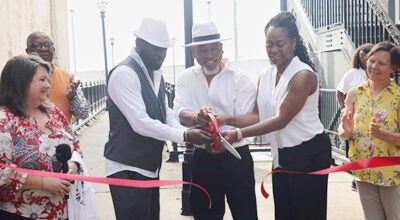Now up to the voters: Sportsplex, new road construction on June 6 ballot
Published 9:53 am Tuesday, March 28, 2017
The fate of the proposed sports complex for Vicksburg and a bypass road from U.S. 61 South to Halls Ferry Road totaling $30 million is officially in the hands of the voters.
The Board of Mayor and Aldermen Monday approved resolutions indicating its intension to levy a 2 percent sales tax on food and beverage sales and hotel rooms in the city for the sports complex, and to build a bypass road from U.S. 61 South to Halls Ferry Road.
The sales tax referendum is June 6, the same day as the general election for municipal offices.
Proceeds from the tax, according to the resolution, will allow the city “to acquire real property, construct, equip, own, operate, lease, furnish, and maintain recreation and tourism facilities, including a sports complex.”
“This is the funding source for everything in regards to the sports complex, from construction to operation, if it is passed,” said South Ward Alderman Willis Thompson.
The bypass road, Mayor George Flaggs Jr. said, would alleviate residents’ concerns about using Halls Ferry Road to reach the sports complex on Fisher Ferry Road. Halls Ferry is heavily traveled and heavily congested in the early morning and late afternoon.
“We believe within the 2 percent — if in fact the 2 percent is voted June 6 and affirmed by more than 60 percent of the voters — we think we have more than enough money to pay for the construction of the road (and the sports complex) and not raise any ad valorem tax.”
The tax has been estimated to raise more than $1 million a year.
The city presently levies a 2 percent hotel tax, which since the 2010 fiscal year has averaged $518,315 a year for the Vicksburg Convention Center. Flaggs said the city is restricted by law to levying up to 2 percent in special sales taxes. That means, he said, the 2 percent convention center tax, which was first collected in fiscal l998, will come off the books and the city will make up the difference.
“We can afford it,” he said.
He said the bypass road, which is estimated at $10 million, “is necessary for the sports complex, but beyond that, for the future of Vicksburg the road I think the road is necessary for some relief and taking some of the traffic off Halls Ferry, and meeting the future needs of ERDC (U.S. Army Engineer Research and Development Center).”
The bypass will run from a point on U.S. 61 South near Rifle Range Road east to intersect with Halls Ferry Road just north of the Halls Ferry/Fisher Ferry split.
It is one of three options under consideration by the board. The other options include a bypass road starting at Dana Road off U.S. 61 South, and an access road from the highway directly to the sports complex site.
Building the U.S. 61 South bypass from Rifle Range, Thompson said, could open up the area to commercial and residential development.
“We have about 500 acres out there,” he said. And while the city is not in the real estate business, he said it could help development by installing the infrastructure and utilities for future development.
“We do have developers who are interested in developing that property.”
Flaggs called the $30 million for the combined project “a drop in the bucket,” adding Ridgeland recently approved a $178 million bond issue for capital improvements and schools.
“I think the time has come that we do these things, and after we vote on this measure, it should clear that this administration has done all we can do as relates to a sports complex,” he said. “We are now putting this out to a vote in the hands of the voters. If the voters choose not to do it, we can’t do it. This is all we can do.”
The current plan to build a sports complex began in 2015 after Flaggs appointed a special committee to examine the city’s sports and recreation facilities and make recommendations.
The Legislature in 2016 approved a local bill authorizing the city to levy up to 2 percent on hotel rooms and food and beverage sales pending voter approval in a referendum.
Vicksburg purchased the Fisher Ferry property in 2003 for a sports complex and spent about $2.7 million in site work on the property before abandoning the project in 2009.
At the time, funds earmarked for the property were rerouted to repair the Washington Street bridge, which had been determined too dangerous for traffic.






